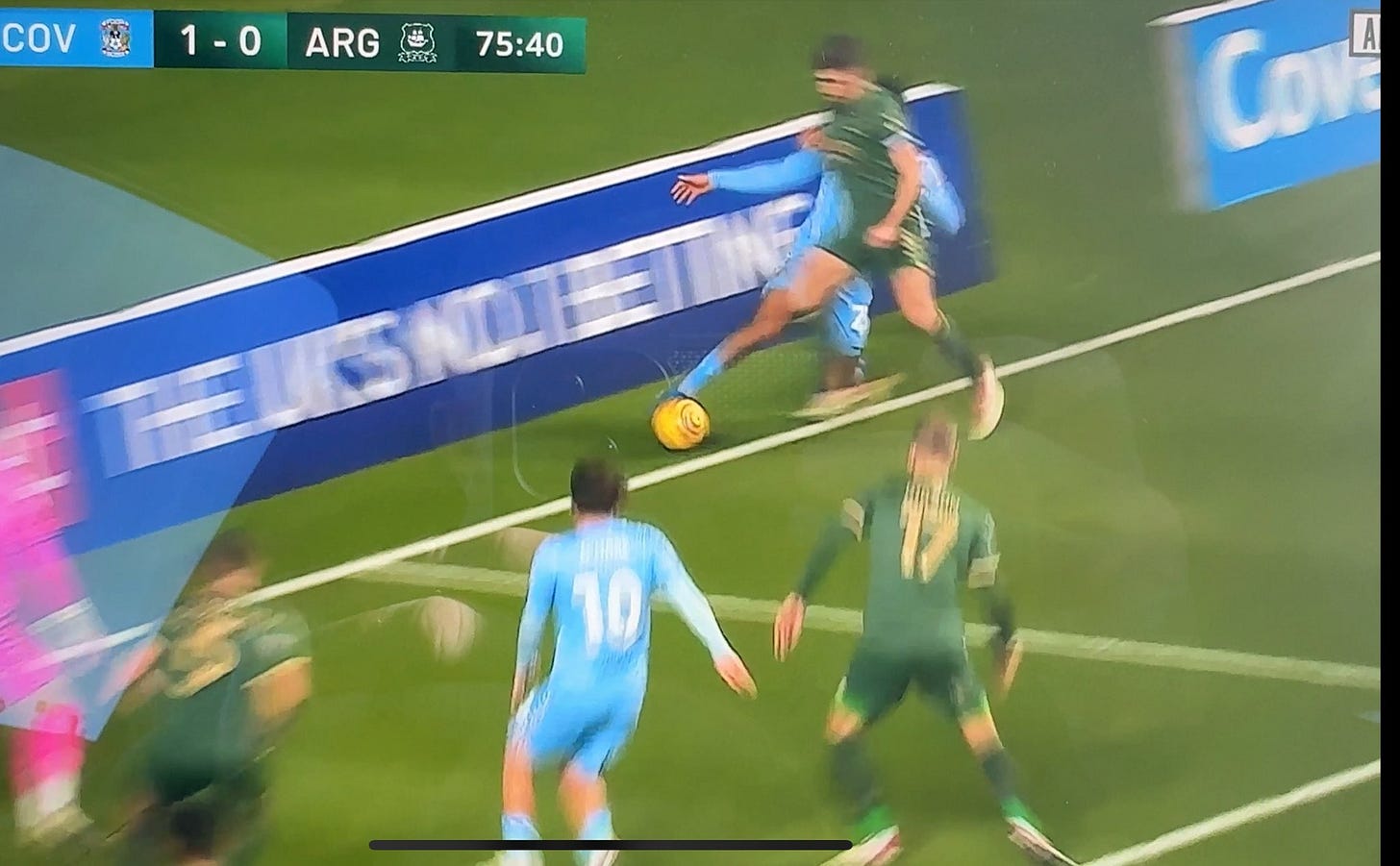Argyle and yet another injustice
We ask: what is even the point?
Welcome to the latest One Team In Devon, hot off the back of another officiating horror show.
Argyle on the end of another terrible officiating decision? Surely not.
The team were set out for one of the great rear-guard performances, and showed total resilience in the face of an expansive (and expensive) Southampton attack.
In the 56th minute, Whittaker, who had a poor game all told, got forward and managed something he and Azaz had failed to do all game: produce a moment of quality on the break. His cutback and floated cross was nodded in by Mumba.
Saints 0 - 1 Argyle.
But as well all know, it was not to be.
It’s not just that Argyle seem to get the dirty end of the stick when it comes to big decisions, but we also seem to confound them by losing our heads in those moments.
When the ball ran out of play at Coventry, we didn’t play to the whistle and conceded.
The Bundu/KKH/Edwards fouls – we go on to concede almost directly.
And then against Southampton, a quick free kick is taken while players are still celebrating/remonstrating. That’s the second officiating howler in that phase of play, and that quick kick should not have been taken – Dewsnip said the same thing himself – but we simply have to stay switched on no matter what the officials throw at us.
Because there’s no reason to think this run of bad decisions will stop.
As a smaller fish in this league, it's simply easier for officials to rule against us.
Does constant officiating issues hurt the game?
(Words by Ben – @llortaton)
Why do we love football? Why is it considered by many – above all other sports – the ‘Beautiful Game’?
An often-overlooked part of it, I believe, is the amount of time the ball is live. There are comparatively few stoppages, for comparatively short periods.
Because of this, the viewer becomes quickly and easily absorbed in the action. It transports you away from the problems, pains and predicaments that exist beyond the field of play occupying your attention. It is – to be blunt – for many, an escape from reality.
But for many, officiating errors are becoming a threat to the beauty and joy of the experience of football.
I have seen many express a similar feeling over the past few months: if the game cannot be refereed fairly, what is the point of playing, or watching - of any of it?
Of course, officiating errors have always happened. So why are they becoming increasingly hard to take?
Is it because now everything is recorded and broadcast? 20 years ago, what we were convinced of in the moment, was just that – a passing moment.
Now, that moment is frozen in pixels and spread across the social-verse for scathing review. And the righteous indignation we felt was always tempered with at least a little uncertainty. Now, though, we are fully vindicated from several angles.
However, I think the biggest issue is the same one mentioned above: it brings you crashing back to reality.
On the pitch everyone is supposed to be treated the same, regardless of wealth and stature. And the best team – or the team that executes its strategy the best – wins. Football is the sport that birthed the term “cup-set”. Football is not like life and its unfairness – at least it is not supposed to be.
But when those injustices seem to occur week after week, one wonders what the point of this emotional investment actually is. Football is no longer a joyous escape from reality, but a bleak reflection of reality in which our only agency is from the stands, or from behind our screens.
What’s the answer? VAR most certainly isn’t, as we’ve seen from the weekly controversies from the Premier League, the supposed pinnacle of the English game.
One could argue that human error is part-and-parcel of the game. Just like an own goal where your goalkeeper comes needlessly off his line and your defensive midfielder passes it into the bottom corner from 35 yards out, under no pressure.
But these mistakes happen over and over; and when it seems beyond rational belief that these crucial errors will "even themselves out", there must be a point at which stakeholders have to say that this isn’t good enough.
If it is not now, that time is surely close.
And unless serious investment is made into the standard of officiating by the EFL, it risks ripping the heart out of our game.
Manager search: an update
I’m reticent to write too much about the manager search here, lest I publish something that looks foolishly out of date 24 hours later. But here we go.
At the time of writing a leading bookies favourite is Scott Parker – a name that seems as unlikely as any of the other bookies favourites so far.
Dewsnip seemed to reveal that interviews had not taken place yet, and that Argyle were busy whittling down the list of 100 applicants.
I still believe it will be a name most fans are unfamiliar with. Dewsnip has re-iterated that it will most likely be a young manager, with something to prove. The bookies, who are listing Gus Poyet, Paul Cook, Scott Parker and Dean Holden would do well to listen.
I’m willing to look stupid and predict that none of those would fit the list of requirements, including wage, or willingness to work under Dewsnip. The structure is in place for a manager with the tools to become an established Championship manager, but without the trappings of wage or ego.
See you in 2024. Have a happy and healthy New Year. COYG





